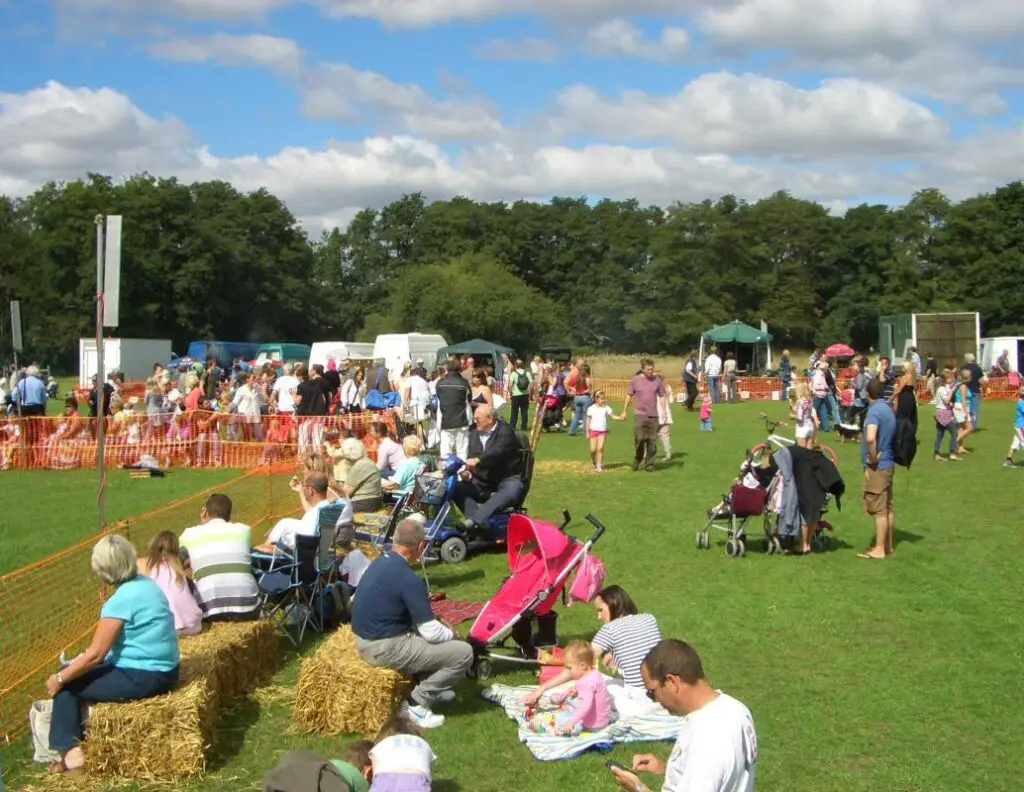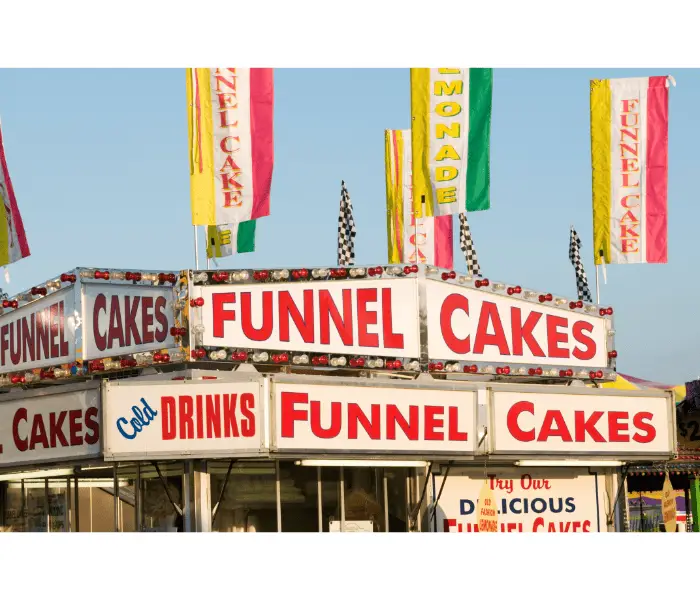If you’re passing a village school or church hall from June to September, chances are you’ll see bunting waving in the breeze and a homemade sign inviting you to attend their ‘summer fete’. And if the sign doesn’t say fete, it’ll probably say ‘fair’.
And then we get to the problem that prompts our question: is there a difference between a fete and a fair? The question may seem a trivial one at first.
But when it comes to British rural life, no question is insignificant. And the answer is, rather unhelpfully, there are differences, but not everyone agrees on what they are.
So why is there no straightforward answer? Because the English language changes continually and the meanings behind words shift too.
You can see it in the spelling: is it fair or fayre? Fete or fête? (They’re all correct!) So it’s no wonder you’ll get a different answer from each person you ask.
But let’s look at the basic difference behind each word to help you decide for yourself!
Are Fete and Fair the same?
While there may be arguments about the difference in the meaning of these two words, most people would agree they are not quite the same. Although the lines between the two are becoming more blurred with the passage of time.
Fete and Fair
But let’s look first at what fetes and fairs have in common:
The most important thing fetes and fairs share is they are both events. And people attending these events would expect some degree of excitement, entertainment or fun.
Whether that comes from tasting delicious food, playing games, or treating yourself to some new item, will depend on the person attending the event. But you could expect to do able to do all of these things at fetes and fairs.
Another thing fetes and fairs have in common is that they are special events. They don’t happen every day, or at least not in the same place every day.
They very often are a one-day-only event, though sometimes they go over two days and, very rarely, three if it’s a bank holiday.
And both events are more likely to be held on a day when people aren’t working. This usually means a weekend or bank holiday.

Very often both events are held outside – so they have that in common too. Not always, though. Sometimes fairs are held in parish halls or in marquees.
Less often fetes are, too, but that is usually because of the unpredictable British weather. Although, we’ll get on to why fairs are more likely than fetes to be held inside a building later.
And lastly, you are very likely going to have to part with some cash at both a fair and a fete. Whether to take part in an activity or for some item you’d like to sample then and there or take home to enjoy later.
So, fairs and fetes have a few similarities but, as you can see, it’s all a bit vague. But don’t worry, the differences between the fetes and fairs will shed more light on the question.
What’s the difference between a Fair and a Fete?
Quite a bit, actually.
And to get a real sense of the differences between the two words we’re going to have to go back in time to the origins of both words.
Fete Definition
A fete came into the English language after the Norman Conquest when French became the language of the ruling class.
During the Middle Ages when Norman French was used in the court of the Kings of England, over 10,000 French words entered English and 75 % of those words are still part of our language today. And one of those is ‘fete’.
It’s not surprising, then, that the French spelling of the word fête is a completely acceptable alternative to the anglicised fete.
And while we may have dropped the accent in the last 1,000 years but the word means much the same as it did back then. And that meaning is: festival, feast or celebration.
For most people, a fete is still more of a celebration than commercial activity. So when you’re going to the school playing fields or the village green for a May Day Fete, your main aim is to eat, drink and be merry – just the same as it would have been back in 1066.
But what exactly can we expect to see and do at a fete? A number of things. Being a celebration, you’ll find stalls selling homemade cakes, jams and chutneys.
You’ll probably be able to get a cup of Britain’s favourite beverage at the tea tent and, if you’re lucky, a pint of our other favourite beverage.
There will be games for children and for adults. They may be races, archery, a coconut shy and perhaps a fierce battle of tug-o-war.
Local dance groups may also perform at fetes or perhaps some amateur musicians will ‘delight’ the ears of the attendees.
There might be stalls selling things but it’s more likely it will be white elephant and second-hand books. It’s very unlikely that a fete will have stalls or sellers that might be considered commercial or professional.
A fete is very firmly local, amateur and centred on community spirit. But if any money is made, it will certainly be going to a good cause.

Why is it called a fair?
Now, it’s time to look at what a fair is and what it means. And, yes, why is it called a fair?
Again, our Norman-French ancestors are to blame. We English adopted this word from the Old French word ‘faire’. And apart from dropping the ‘e’ at the end, this is another word that has changed very little over the last millennium.

Summer Fayre or Fair
It seems right to point out that ‘fayre’ was also an accepted alternative spelling before orthography was standardised in the last few hundred years. It meant: ‘a stated market in a town or city’.
So the meaning of the word fair was primarily commercial. It would be held, like it is in many towns today, in the main square where professional makers or dealers in goods and produce would sell their wares at the highest prices they could get.
The profits went into the pockets of the market stall holders, not to charity.
From this, we get the main difference between the two types of events. A fete is celebratory, a fair is commercial – even when the selling is in a very amateur way.
And that is why you are more likely to get fair being held inside a building rather than outside. Because commerce should not be stopped by the weather!
Today, though, it’s just as likely a summer fair will be held to raise money for a good cause, or to raise funds for a specific thing, such as sports equipment for a school. Its main aim is still commercial, though, and that main difference between fete and fair is still retained.
Is There Another Difference Between a Fete and a Fair?
The word ‘fair’ has a secondary meaning related to religious holy days (holidays). These would have been like our bank holidays – a day where work was light or non-existent to encourage as many as possible to go to church.
A by-product was that cunning market traders made the most of this day of rest to set up pop-up markets (fairs) and, of course, people would be delighted to head to the fair for fun after the solemnity of worship was over.
And this is perhaps why some fairs are purely of the entertainment type: the fun fair. Rides, games and candy floss are wonderful traditions, and a trip to the fun fair is a right of passage for most British kids. Who didn’t win a goldfish in a bag at a fun fair, back in the day?
In a way, it’s good no animals are tortured for the sake of fun anymore, but the fun fair is still a source of joy for the young and young at heart all over the country.
And you may notice another crossover between a fete and fair – games. It’s possible that the games at fairs were so popular they became a part of the celebrations that took part during village fetes.
But there’s no doubt that the games held at modern fetes are not on the same scale as fun fairs.
The most exciting game at village fetes is likely to be splat-the-rat, and that’s never going to be as exciting as being asked “Shall I spin you again?” on the waltzers.
We think we’ve covered the main differences between fetes and fairs but we know it’s a subject that is open to debate.
In fact, the well-known radio programme, The Archers, asked the same question to its listeners not long ago and failed to reach a consensus.
So it seems the answer to our question really does depend on who you ask!


